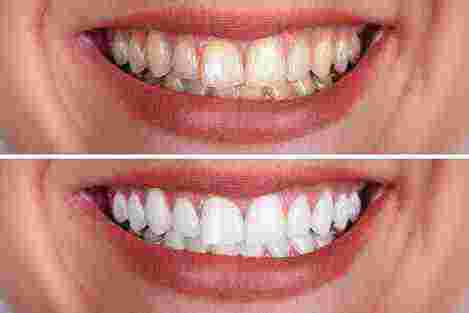A bright smile is often viewed as a reflection of both health and confidence. While brushing, flossing, and dental check-ups are crucial, diet also plays a vital role in maintaining the appearance of your teeth. The foods and drinks you consume daily can either support natural whiteness or contribute to staining and discolouration. Certain fruits and vegetables act as natural cleaners, while items like coffee, tea, and red wine may dull your smile. This blog explores the relationship between diet and tooth colour, offering insights into the best dietary choices for achieving and maintaining naturally whiter, healthier-looking teeth.

Understanding Tooth Discolouration
Tooth colour is influenced by a combination of genetics, oral hygiene, lifestyle, and diet. However, discolouration primarily falls into two categories:
- Extrinsic staining: Surface-level stains caused by external sources such as food, drink, and tobacco. These are the most common and often reversible with proper care.
- Intrinsic staining: Deeper discolouration inside the tooth, often due to trauma, certain medications, or ageing. These may require professional treatment to address.
Dietary choices affect both categories. Foods and drinks high in pigment, acidity, or sugar can wear down enamel, making teeth more stain-prone. However, with guidance from a Dentist in Rochdale, natural foods that act as gentle abrasives or boost saliva can help wash away particles and neutralise harmful acids.
Foods That Help Keep Teeth White
Believe it or not, your daily meals may already include foods that support oral brightness. Here are some beneficial options:
1. Crunchy Fruits & Vegetables
These foods help scrub away plaque and debris as you chew, working like nature’s toothbrush.
- Apples
- Carrots
- Celery
- Cucumber
Benefits:
- Stimulate saliva production (which neutralises acid)
- Offer a mild abrasive effect to remove surface stains
- Contain water and fibre for cleansing
2. Dairy Products
Dairy is rich in calcium and phosphates, which help maintain strong enamel and neutralise mouth acidity.
- Cheese
- Yoghurt
- Milk
Benefits:
- Supports enamel remineralisation
- Encourages saliva production
- Some cheeses form a protective layer on the teeth
3. Water-Rich Foods
Foods with high water content dilute stain-causing substances and keep the mouth hydrated.
- Watermelon
- Cucumber
- Lettuce
4. Enzyme-Rich Fruits
These fruits contain natural compounds that may reduce surface staining.
| Fruit | Natural Compound | Whitening Effect |
| Pineapple | Bromelain | Helps remove plaque and surface stains |
| Strawberries | Malic acid | Gently dissolves mild discolouration |
Important Note: While these fruits can help, they are also acidic. Rinse your mouth with water afterward to protect enamel.
Foods and Drinks That Stain Teeth
Some of the most popular daily consumables are notorious for causing discolouration. These items are high in chromogens (pigmented molecules), acids, or tannins, which bind to the enamel and lead to staining.
Common Staining Culprits:
- Beverages:
- Coffee
- Tea
- Red wine
- Fizzy drinks
- Foods:
- Berries (e.g., blueberries, blackberries)
- Tomato-based sauces
- Soy sauce
- Balsamic vinegar
- Other factors:
- Highly pigmented spices like turmeric and curry
- Sweets and acidic treats that wear down enamel
Why They Stain:
- Dark pigments cling to enamel
- Acids erode enamel, making it easier for stains to stick
- Sugars fuel bacteria that produce enamel-eroding acids
Avoiding these foods altogether isn’t realistic, but moderation and good aftercare can make a huge difference.
Practical Eating Habits for a Brighter Smile
Even if you include tooth-friendly foods in your diet, how and when you eat can influence their effectiveness. Adopting simple habits can maximise the whitening potential of your meals.
Tips to Maintain a Bright Smile Through Diet:
- Drink water with meals to rinse food particles and neutralise acids.
- Use a straw when drinking dark or acidic beverages to reduce contact with teeth.
- Eat cheese or leafy greens before wine or coffee to coat and protect enamel.
- Chew sugar-free gum after meals to boost saliva production.
- Avoid brushing immediately after acidic foods wait 30 minutes to prevent enamel damage.
- Include fibrous vegetables in each meal to help scrub the teeth while chewing.
These small actions, paired with a balanced diet, contribute significantly to a naturally whiter smile.
When Diet Alone Isn’t Enough
While dietary choices are essential for maintaining oral health and natural whiteness, they may not suffice for everyone, especially in cases of deep-set or intrinsic staining.
Professional solutions can help:
- Teeth whitening Rochdale treatments effectively lift stubborn stains.
- Dentist consultations help identify the root cause of discolouration.
- Tailored whitening plans ensure results suit your dental needs.
Whether it’s an in-chair procedure or a supervised take-home kit, dental professionals ensure that:
- Treatments are safe for enamel and gums
- Results are long-lasting and visibly effective
- Any side effects, like sensitivity, are managed properly
By combining expert care with good oral habits, you achieve a cleaner, brighter smile that diet alone may not deliver.

Balanced Approach to a Healthy Smile
Finding the right balance between enjoyment and oral care is key. You don’t have to give up your favourite foods, but being conscious of their impact on your teeth is a smart move. Pair potentially staining items with protective ones, and always follow up with water or oral hygiene practices.
Example: Teeth-Friendly Meal Plan
| Meal | Example Dish | Whitening Benefit |
| Breakfast | Greek yoghurt with sliced strawberries | Calcium-rich with natural whitening enzyme |
| Snack | Apple slices with cheddar cheese | Crunchy cleansing and enamel support |
| Lunch | Grilled chicken with spinach and carrots | High fibre and enamel-safe |
| Afternoon | Cucumber sticks or sugar-free gum | Hydration and saliva stimulation |
| Dinner | Steamed salmon with quinoa and broccoli | Nutrient-dense and non-staining |
This kind of mindful eating helps promote oral health while naturally supporting whiter teeth over time.
Conclusion
A bright, healthy smile starts not only with brushing but also with the foods you choose to eat. By including foods that naturally support oral cleanliness and enamel strength while being mindful of those that cause stains, you can maintain or even improve the colour of your teeth in a sustainable way. Pair these practices with routine dental check-ups to achieve the most effective results. For deeper whitening solutions or a professional opinion tailored to your smile, the team at Rochdale can guide you with expert care and modern dental options.




